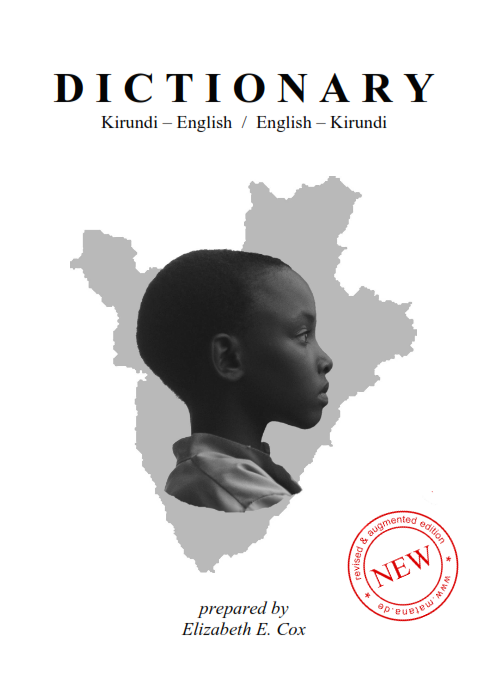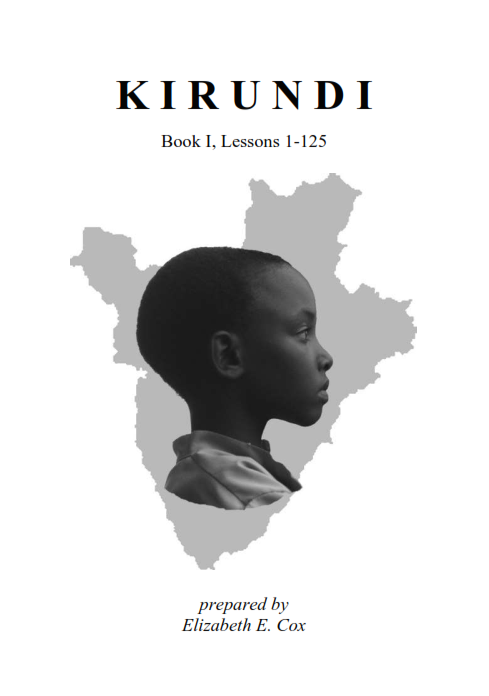akahise 7 class 7
singular: aka-,aga- ▶ 1. the past, history, 2. past (grammar)
singular: aka-,aga- ▶ 1. the past, history, 2. past (grammar)
-fise v ▶ to have (verb without infinitive or past)
gushīra v ▶ (verb without past) to be almost over (night)
ijoro rishīra ubuca night is almost over, about to dawn
ijoro rishīra ubuca night is almost over, about to dawn
-fitiye v ▶ to have for (verb without infinitive or past)
ivyabaye 4 ▶ things that happened in the past
-ri v ▶ is, are (verb without infinitive or past)
-rimwo contains
irahari available
-rimwo contains
irahari available
-zi v ▶ to know (verb without infinitive or past)
guturutsa (-turukije) v ▶ to lead (e.g. cows out to pasture)
ibicuba 4 ▶ pastoral singing, traditional sung poetry in honor of cattle
icānya (ivy-) 4 class 4
singular: iki-,ic-
plural: ibi-,ivy- ▶ place surrounding great chief's kraal, good pastures
singular: iki-,ic-
plural: ibi-,ivy- ▶ place surrounding great chief's kraal, good pastures
isambusa (ama-) 5 class 5
singular: i-,iri-
plural: ama- ▶ samosa (fried pastry of Indian origin)
singular: i-,iri-
plural: ama- ▶ samosa (fried pastry of Indian origin)
kugānza (-gānje) v ▶ to rule over, govern (past also njije)
ganza, sabwe! long live the king! (greeting to superior)
ganza, sabwe! long live the king! (greeting to superior)
kugisha (-gishije) v ▶ 1. to take to greener pastures, 2. to increase, multiply (because of having fed well) (vi)
kugishūra (-gishūye) v ▶ 1. to take a thing home from where you've left or put it, 2. to take cows home after being away a long time to pasture
kuragira (-ragiye) v ▶ to pasture (vt), to watch flock, to shepherd
kuragirana (-ragiranye) v ▶ to pasture together
kuragiza (-ragije) v ▶ to entrust flock to another to pasture, to help pasture
kurārāta (-rārāse) v ▶ to hurry along (as cows to better pasture, or child stumbling after something he wants), to be unstable, to go from one thing to another
kurīsha (-rīshije) v ▶ to eat with (instrument), to pasture, to cause to eat
kurīshwa (-rīshijwe) v ▶ to be caused to eat, be pastured
kuzirika (-ziritse) v ▶ to tie with rope (as goat out to pasture)
kwāhuka (-āhutse) v ▶ 1. to pasture, 2. to begin a task
kwāhura (-āhuye) v ▶ 1. to pasture animals in good place, 2. to put to work
umugutu (imi-) 2 class 2
singular: umu-
plural: imi- ▶ fresh pasture (new shoots of grass)
singular: umu-
plural: imi- ▶ fresh pasture (new shoots of grass)
umupasitori (aba-) 1 class 1
singular: umu-
plural: aba- ▶ pastor
singular: umu-
plural: aba- ▶ pastor
umuvovoto (imi-) 2 class 2
singular: umu-
plural: imi- ▶ pastoral singing, pastoral eulogy (from kuvōvōta)
singular: umu-
plural: imi- ▶ pastoral singing, pastoral eulogy (from kuvōvōta)
animal ▶ (domestic) igitungano
(wild) igikoko, inyamāswa
(male in heat) ishāshi
(of nice disposition) ikirende
(track of) umwānza
(truly animal) bukōko
(young of) umukāngara
(young of small) imbūnda
(antelope) impōngo
(small antelope) ingeregere
(bat) agahūngarēma
(bear) idubu
(buffalo) imbogo
(young bull) ishūri
(male calf) ikimasa
(camel) ingamiya, ingameya
(cat) akayabo, akayabu
(chameleon) uruvo, uruvuruvu
(cheetah) igikara
(civit cat) icūya
(crocodile) ingōna
(deer) impōngo
(dog) imbwa,
(female) imbwakazi,
(wolf-like wild) ibīngira
(donkey) indogoba, indogobwe
(elephant) inzovu
(ferocious) igisimba
(fox) imbwēbwe
(frog) igikere
(gazelle) ingeregere
(giraffe) umusumbarembe
(goat) impene,
(male) impfīzi,
(young male goat) agasugurume
(goats) intūngwa, igitūngwa
(hare) urukwāvu
(hippopotamus) imvubu
(hyena) imfyisi
(jackal) imbwēbwe
(kid, lamb) umwāgazi
(lion) intāmbwe, intare
(lizard) umuserebanyi
(mongoose) isambwe
(monkey) inkēnde, imamfu
(puppy) ikibwāna, imbūnda
(python) isato
(rabbit) urukwāvu
(ram) isuguru
(rat, mouse) imbeba
(rat, cane) isiha
(sheep) intāma, intūngwa, igitūngwa
(toad) igikere
(weasel) akarīnda, akagomba
(zebra) imparage
(to give salt to domestic ~) kwūhīra
(to lead to drink) gushōra
(to stake out to pasture) kuzirika
(wild) igikoko, inyamāswa
(male in heat) ishāshi
(of nice disposition) ikirende
(track of) umwānza
(truly animal) bukōko
(young of) umukāngara
(young of small) imbūnda
(antelope) impōngo
(small antelope) ingeregere
(bat) agahūngarēma
(bear) idubu
(buffalo) imbogo
(young bull) ishūri
(male calf) ikimasa
(camel) ingamiya, ingameya
(cat) akayabo, akayabu
(chameleon) uruvo, uruvuruvu
(cheetah) igikara
(civit cat) icūya
(crocodile) ingōna
(deer) impōngo
(dog) imbwa,
(female) imbwakazi,
(wolf-like wild) ibīngira
(donkey) indogoba, indogobwe
(elephant) inzovu
(ferocious) igisimba
(fox) imbwēbwe
(frog) igikere
(gazelle) ingeregere
(giraffe) umusumbarembe
(goat) impene,
(male) impfīzi,
(young male goat) agasugurume
(goats) intūngwa, igitūngwa
(hare) urukwāvu
(hippopotamus) imvubu
(hyena) imfyisi
(jackal) imbwēbwe
(kid, lamb) umwāgazi
(lion) intāmbwe, intare
(lizard) umuserebanyi
(mongoose) isambwe
(monkey) inkēnde, imamfu
(puppy) ikibwāna, imbūnda
(python) isato
(rabbit) urukwāvu
(ram) isuguru
(rat, mouse) imbeba
(rat, cane) isiha
(sheep) intāma, intūngwa, igitūngwa
(toad) igikere
(weasel) akarīnda, akagomba
(zebra) imparage
(to give salt to domestic ~) kwūhīra
(to lead to drink) gushōra
(to stake out to pasture) kuzirika
En-En dictionary
cow ▶ inka
(brownish black) ikirāyi
(gray) uruhīza
(white) igihororo
(~ without horns) imvure
(blood of, to drink) ikiremve
(~ path) umuhōra
(to be at rest) kuvyāgira
(to be many) gusagara
(to be many together) gusasa amahembe
(to ask ~ from one to whom ~ was given) kwōkōza
(to chase flies off) kuzīnga
(to entrust ~s to another and they increase while there) gutongoza
(to get medicine to make ~ like her calf) kwōrokereza
(to lead) kuyobora, gushorera
(to lead to pasture) guturutsa
(to put skin of dead calf before ~ to make her to give milk) kwōrokēra
(to return ~ or calf to one from whom one received a ~) kwōkōra
(to take up hill) kurārūra
(to tie legs while milking) kujīsha
(brownish black) ikirāyi
(gray) uruhīza
(white) igihororo
(~ without horns) imvure
(blood of, to drink) ikiremve
(~ path) umuhōra
(to be at rest) kuvyāgira
(to be many) gusagara
(to be many together) gusasa amahembe
(to ask ~ from one to whom ~ was given) kwōkōza
(to chase flies off) kuzīnga
(to entrust ~s to another and they increase while there) gutongoza
(to get medicine to make ~ like her calf) kwōrokereza
(to lead) kuyobora, gushorera
(to lead to pasture) guturutsa
(to put skin of dead calf before ~ to make her to give milk) kwōrokēra
(to return ~ or calf to one from whom one received a ~) kwōkōra
(to take up hill) kurārūra
(to tie legs while milking) kujīsha
En-En dictionary
entrust ▶ kubītsa, kuzēza
(~ to) kurindīsha, gusigarana
(~ flock to another to pasture) kuragiza
(~ something to another and it increases while there) gutongoza
(~ to) kurindīsha, gusigarana
(~ flock to another to pasture) kuragiza
(~ something to another and it increases while there) gutongoza
En-En dictionary
flock ▶ isho, ubusho, urwūri
(of little birds) urwīha
(of sheep or goats) inzirikwa
(to entrust ~ to another to pasture) kuragiza
(to watch flock) kuragira
(of little birds) urwīha
(of sheep or goats) inzirikwa
(to entrust ~ to another to pasture) kuragiza
(to watch flock) kuragira
En-En dictionary
hurry ▶ kwīhūta, kwīruka, gukovya, gukōkōbereza, gukwākwānya, kunyānyasa, kunyaragasa, kunyaruka, gushibuka
(of child only) kudirigiza
(to go) kubāndānya
(to go and return) gutebūka
(along, as cows to better pasture, or child stumbling after something he wants) kurārāta
(to be in a ~) gufuruguta
(to do in a ~) kubanguka
(to not be in a ~) kwītōnda
(of child only) kudirigiza
(to go) kubāndānya
(to go and return) gutebūka
(along, as cows to better pasture, or child stumbling after something he wants) kurārāta
(to be in a ~) gufuruguta
(to do in a ~) kubanguka
(to not be in a ~) kwītōnda
En-En dictionary
lead ▶ (to) kwōsha, kurōngōra
(a discussion) kuremesha ikiganiro
(esp. cows) gucūra, kuyobora, gushorera
(animals to drink) gushōra
(astray) guhuvya, kuzimiza
(cows to pasture) guturutsa
(to attack) kugomora
(out, to show the way to one who is lost) kuzimurura
(a discussion) kuremesha ikiganiro
(esp. cows) gucūra, kuyobora, gushorera
(animals to drink) gushōra
(astray) guhuvya, kuzimiza
(cows to pasture) guturutsa
(to attack) kugomora
(out, to show the way to one who is lost) kuzimurura
En-En dictionary
pasture ▶ (belonging to great chief) icānya
(fresh, new shoots of grass) umugutu
(to ~, vi) kwāhuka
(to ~, vt) kuragira, kurīsha
(animals in good place) kwāhura
(in greener pastures, vt) kugisha
(to lead cows to) guturutsa
(fresh, new shoots of grass) umugutu
(to ~, vi) kwāhuka
(to ~, vt) kuragira, kurīsha
(animals in good place) kwāhura
(in greener pastures, vt) kugisha
(to lead cows to) guturutsa
En-En dictionary
shoot ▶ (sprout) umunago
(tiny, of bean or other plant) umugoreko
(new shoots of grass, fresh pasture) umugutu
(to send forth shoots) gutōha
(tiny, of bean or other plant) umugoreko
(new shoots of grass, fresh pasture) umugutu
(to send forth shoots) gutōha
En-En dictionary
singing ▶ ururirimbo, indirīmbo
(dancing with ~) uruvyino
(pastoral ~, sung poetry) ibicuba
(sung legend) igitito
(post-drinking song) amayaya
(pastoral ~) umuvovoto
(sentimental evening ~) ikilito
(~ for the hunt) gukokeza
(to lead in ~) kuririmbisha
(dancing with ~) uruvyino
(pastoral ~, sung poetry) ibicuba
(sung legend) igitito
(post-drinking song) amayaya
(pastoral ~) umuvovoto
(sentimental evening ~) ikilito
(~ for the hunt) gukokeza
(to lead in ~) kuririmbisha
En-En dictionary
stake ▶ (out goat in pasture) kuzirika
(drive ~) gushīnga
(to come out, ~) gushingūka
(to pull out ~) gushingūra
(drive ~) gushīnga
(to come out, ~) gushingūka
(to pull out ~) gushingūra
En-En dictionary
tie ▶ (to ~) kuboha, guhāmbīra
(beans on hedge to dry) gushisha
(clothes at waist) gukenyeza
(cow's legs while milking) kujīsha
(firmly) kudādira
(neck of sack) kuniga
(oneself to) kwīhābīra
(rope) kudādira
(securely) kudaga
(together) gutubika, gupfundikanya
(up a bundle) gutēkera
(with knot) gupfundika
(as goat in pasture) kuzirika
(beans on hedge to dry) gushisha
(clothes at waist) gukenyeza
(cow's legs while milking) kujīsha
(firmly) kudādira
(neck of sack) kuniga
(oneself to) kwīhābīra
(rope) kudādira
(securely) kudaga
(together) gutubika, gupfundikanya
(up a bundle) gutēkera
(with knot) gupfundika
(as goat in pasture) kuzirika
En-En dictionary
pasture ▶ (to ~, vi) kwāhuka
(to ~, vt) kuragira, kurīsha
(animals in good place) kwāhura
(in greener pastures, vt) kugisha
(to lead cows to) guturutsa
(to ~, vt) kuragira, kurīsha
(animals in good place) kwāhura
(in greener pastures, vt) kugisha
(to lead cows to) guturutsa
En-En dictionary
past found in: Kirundi I (Study lessons)
lesson 51 ▶ Ordinary Past Tense I
lesson 52 ▶ Rules for Past Endings
lesson 53 ▶ Past Verb Endings
lesson 54 ▶ Ordinary Past Tense II
lesson 55 ▶ Negative of Ordinary Past
lesson 56 ▶ Past of –ri
lesson 60 ▶ Review 51 - 59
lesson 64 ▶ Stative Voice
lesson 71 ▶ Far Past Tense
lesson 72 ▶ Negative of Far Past
lesson 75 ▶ Immediate Past (or, –ra– Past)
lesson 78 ▶ Causative Verbs I
lesson 81 ▶ Review 71 - 80
lesson 84 ▶ Past of Passives
lesson 85 ▶ Passives of Monosyllabic Verbs
lesson 90 ▶ Review 82 - 89
lesson 91 ▶ Dependent Clauses
lesson 93 ▶ Demonstrative Pronouns
lesson 95 ▶ Relative Clauses (No noun antecedent)
lesson 98 ▶ Prepositional Form of Verb
lesson 99 ▶ Uses of Prepositional Form
lesson 101 ▶ Reading Lesson
lesson 106 ▶ Reciprocal Form of Verb
lesson 107 ▶ Associative Verbs
lesson 109 ▶ How to Say “Why?”
lesson 111 ▶ How to Say “Some”; The Conditional
lesson 121 ▶ More Miscellaneous Expressions
lesson 124 ▶ Narrative Tenses II
lesson 125 ▶ Review 111 - 124
past found in: Kirundi II (Grammar)
chapter 1 ▶ Compound Past Tenses
chapter 2 ▶ Compound Future Tenses, Compound Conditional
chapter 3 ▶ Conditional Sentences – “if”
chapter 6 ▶ Habitual Past
chapter 7 ▶ “never-yet” Tenses
chapter 9 ▶ “immediately”
chapter 10 ▶ –o– Conditional in Present, Past and Future
chapter 16 ▶ Prefixless Past Tense
chapter 18 ▶ Optative Mood
chapter 22 ▶ Participles
chapter 24 ▶ “still” and “no longer” in the Past and Future
chapter 36 ▶ kumara as an Auxiliary Verb
chapter 46 ▶ “when” Clauses











 printable PDF files.
printable PDF files.

 This unique dictionary by Betty Cox is known for the deep cultural insight it provides to many Kirundi terms. It has been thouroughly revised, adapted to present-day Kirundi orthography rules and many new words and meanings have been added.
This unique dictionary by Betty Cox is known for the deep cultural insight it provides to many Kirundi terms. It has been thouroughly revised, adapted to present-day Kirundi orthography rules and many new words and meanings have been added. The Kirundi self study course guides you through 125 lessons and makes you learn both the necessary vocabulary and basic grammar.
The Kirundi self study course guides you through 125 lessons and makes you learn both the necessary vocabulary and basic grammar. English pronunciation by
English pronunciation by


